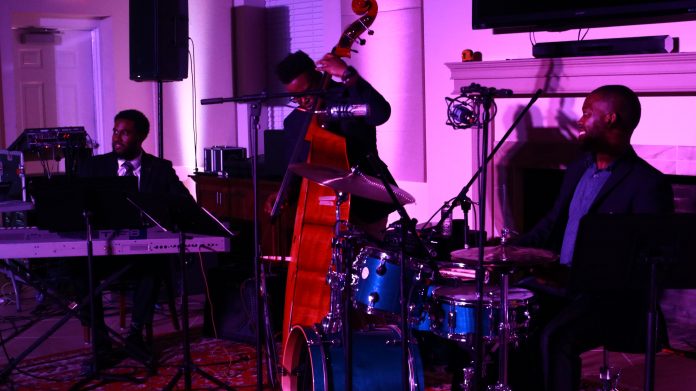
By Peter Edgar
In the Fannin Center last Saturday, following the Welcome Home event in Wynee’s Bistro, The Multicultural Student Council hosted a jazz group as part of its kickoff event for Hispanic Heritage Month. The band was composed of pianist Liston Gregory, drummer Gerald Law, and Jonathan Baptiste, after whom the group is named. Baptiste is the brother of Derrick Jean-Baptiste, communications and psychology double-major and Simmons Multicultural center intern.
During the Cultural Coffeehouse event, the Jonathan Baptiste Trio played a collection of jazz standards and Baptiste’s original compositions for a two-hour set with a 20-minute intermission.
Baptiste described it as “free,” “exploring different textures and sounds.”
They had little time to rehearse before the event besides the sound check, but he seemed to think the set went well, especially one of his original compositions, “Homo Sum.”
The title harks from a favorite quote of Maya Angelou, for whom the song is written: “I am human, and nothing human is alien to me.” Baptiste was amused, as well as irked, that the audience who tagged him about the song misheard the title, captioning their social media posts “Don’t Assume.”
Baptiste has won several awards and scholarships and has played with big names in music, from Grammy Award-winning artist Tivon Pennicott to hit gospel artist Lisa McClendon.
“It’s been crazy. I’ve been thrown into the pool of sharks” Baptiste said. “It really got on me that I either had to [improve] or set my instrument down, ” .
The bassist also plays piano and tuba.
He described the naming of his group succinctly. “I wanted to use my name… “I was going to do something extravagant but then I just settled on the Jonathan Baptiste Trio.” He said, this shouldn’t diminish from the other players. “All of us are artists in our own rank. They’ve played with Grammy Award-winning artists themselves.” One of them, he says, is going on tour internationally with Ulysses Owens.
Baptiste believes that his roots were instrumental (no pun intended) in developing as a person.
He notes his education at Polk State, where he started as a tuba major, and the inspiration of Blues and Gospel he experienced in the Church. He is working on recording more music. Only three of his original compositions are on his SoundCloud right now.
The next recording opportunity he has will be at a festival in Jacksonville.
Baptiste doesn’t neglect the communities he started in. He teaches music at the Ulysses Owens’ Don’t Miss a Beat Music Academy, an experience he describes as great. It gives him a opportunity to work with kids who have pretty bad backgrounds and inner city kids who don’t have a lot of guidance. The program also teaches them more than music, seeking to instruct them in positive core values.
Jean-Baptiste described the intensity of his brother’s early training.
“Yeah, he has callouses on his hands. When he started [practicing] like that, his fingers would bleed,” Jean-Baptiste said.
Now, Baptiste practices from four to six hours a day. He is constantly listening to music, seeking to learn, but he takes another approach to musical growth as well.
“Looking at nature…the way that the wind blows, I can take an example of that,” Jean-Baptiste said. “It blows in long spurts.”
He mimics this in his song “The Wind,” using long melodies followed by cool lulls.
Next week, he is playing with Nat Adderley, Jr. the son of trumpeter Nat Adderley and nephew of Cannonball Adderley, the alto saxophonist and “jazz legend.”
“I’m looking forward to playing with that,” Baptiste said,“and I’m looking forward to finishing the semester.”
He only has one more year before he will graduate from college.
A variety of students, professors and members of the community attended the Cultural Coffeehouse event. A few FSC musicians attended, such as Benjamin Estes, a sophomore music major.
“I’m so happy; they’re so good,” Estes said.
He noted that Florida Southern once had an opportunity for jazz combo a, group of three to six musicians, but that it was discontinued.
The event, featured not only the music but also a collection of Latin-American cuisine, churros, chorizo, Spanish lasagna, empanadas, and rice and beans, and a series of trifolds depicting the flags of the Central and South-American nations, it was a hit with those who attended. The video of the interview is available on Entertainment Stew.







